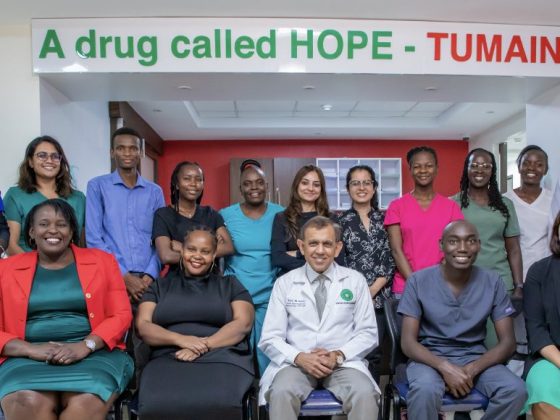Higher intakes of plant foods following a diagnosis of prostate cancer were associated with lower risks of cancer progression. The study, published in JAMA Netw Open, 1 May, found men diagnosed with early prostate cancer whose plant food intake was in the highest quintile (20%) had 47% lower risk of progression than those in the lowest quintile.
“These findings align with national recommendations [of the National Comprehensive Cancer Network and the American Society for Clinical Oncology], and should be part of the nutritional assessment and counselling that all men should receive after diagnosis to support the management of health and nutritional status during prostate cancer treatment and long-term health and survival,” Stacey Kenfield, the lead author from the University of California, San Francisco, tells Cancerworld.
With increased consumption of plant-based foods at the population level, examining whether plant-based diets are associated with disease outcomes has important implications for public health. While studies have reported that greater intakes of individual plant-based foods (e.g., cruciferous vegetables, cooked tomatoes, and vegetable fats) are associated with lower risks of prostate cancer recurrence or mortality, dietary factors in isolation may not accurately capture the health effects of whole diets.
In the current study, Kenfield and colleagues set out to explore the association between post-diagnostic intakes of plant-based foods in relation to clinical outcomes among patients with prostate cancer. The analysis included a subset of 2,062 men with stage IIIA or lower non-metastatic prostate cancer who had taken part in the Cancer of the Prostate Strategic Urologic Research Endeavor (CaPSURE) study. Participants filled out comprehensive diet and lifestyle questionnaires, asking on average how often (ranging from never to six servings/day) they consumed a standard portion size of approximately 140 distinct foods and beverages in the past year. The study focused on two plant-based diet indices, described in a 2017 paper in J AM Coll Cardiol: the overall plant-based diet index (which emphasises consumption of all plant food while reducing animal food intake), and healthful plant-based index (which emphasises intake of healthy plant foods associated with improved health outcomes, such as whole grains, fruits and vegetables).
Researchers created 18 different food groups including seven healthful plant foods (whole grains, fruits, vegetables, nuts, legumes, vegetable oils, and tea and coffee), six animal foods (animal fats, dairy, eggs, fish and seafood, meat, and miscellaneous animal-based food), and five unhealthy plant foods (fruit juices, sugar-sweetened beverages, refined grains, potatoes, and sweets or deserts).
During a median follow-up of 6.5 years after questionnaires were administered, 190 progression events and 61 prostate cancer-specific mortality events were observed.
Results show men scoring in the highest quintile of the plant-based diet index had a 47% lower risk of progression (a composite outcome of biochemical recurrence, secondary treatment, bone metastases, or death from prostate cancer) than men scoring in the lowest quintile (HR=0.53; 95%CI 0.25–0.81; Ptrend=0.01).
Overall, scores of the healthful plant-based index were not associated with the risk of progression. However, when 680 men with Gleason grade 7 or higher were analysed separately, those in the highest quintile for the healthful plant-based index had a 55% lower risk of progression compared to those in the lowest quintile (HR=0.45; 95%CI 0.25–0.81; Ptrend=0.01). No association with prostate cancer progression was observed for the healthful plant-based index in men with Gleason grades less than 7. “As has been found in other studies, dietary modifications may potentially benefit patients with more advanced stages of disease,” explains Kenfield.
No associations were found between the unhealthy plant or animal food groups and risk of prostate cancer progression.
Men in the top quintile of the healthful plant-based index, Kenfield says, were eating an easily achievable 2.4 servings of fruit and 4.1 servings of vegetables per day. “Men should push themselves further if they can,” she says.
Theories for the mechanisms whereby plant-based diets may improve prostate cancer outcomes include fruits and vegetables containing a variety of phytochemicals (including antioxidants and anti-inflammatory compounds), plant foods being a source of dietary fibre (promoting satiety and regulating blood glucose), and meat and dairy being associated with exposure to harmful substances (such as hormones and heterocyclic amines).
Next, Kenfield hopes to explore whether the findings persist in a more racially/ethnically diverse population and in men with metastatic disease, and to undertake a randomised controlled trial, which, she says, “is necessary to make a causal statement about plant-based diets and the effect on clinical outcomes”.
Eric Biers, from the prostate cancer patients advocacy group Europa Uomo, says that dietary advice given to prostate cancer patients in Europe is mostly down to the personal initiative of the urologist or nurse specialist. “Usually this will be linked to the presence of obesity or diabetes. It would be helpful if it became common practice for everyone to have a conversation about diet and lifestyle at diagnosis,” he tells Cancerworld.












